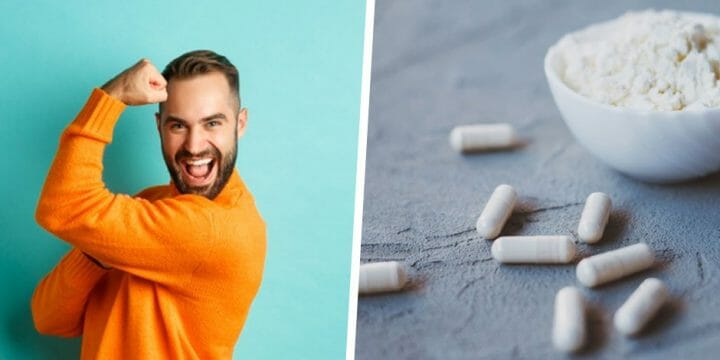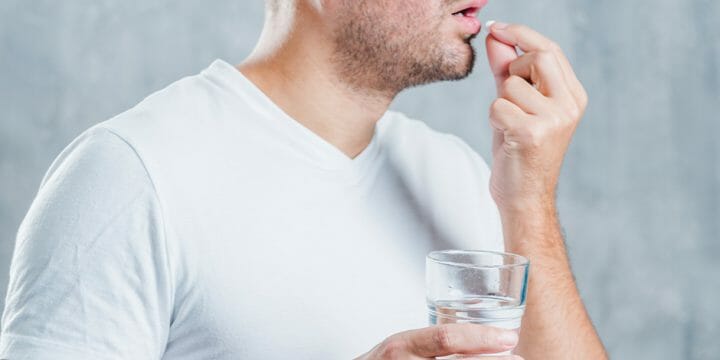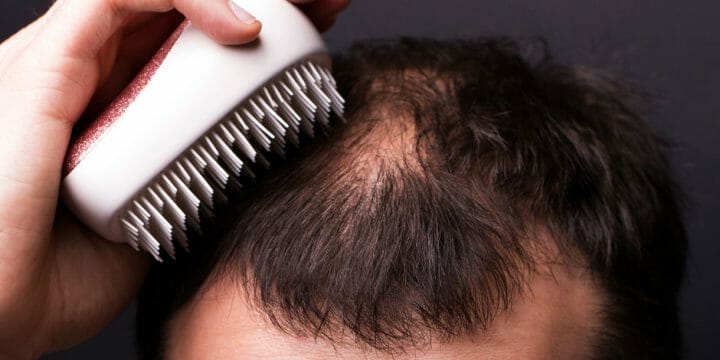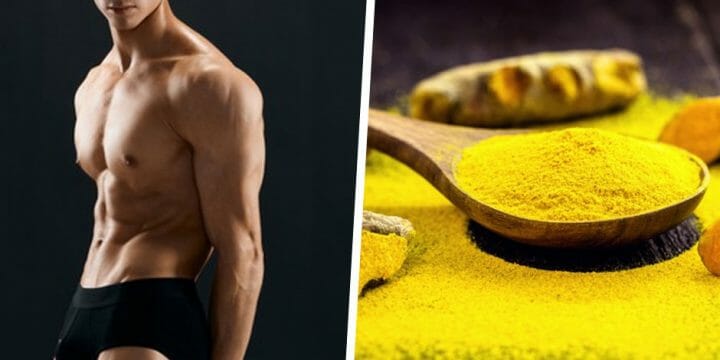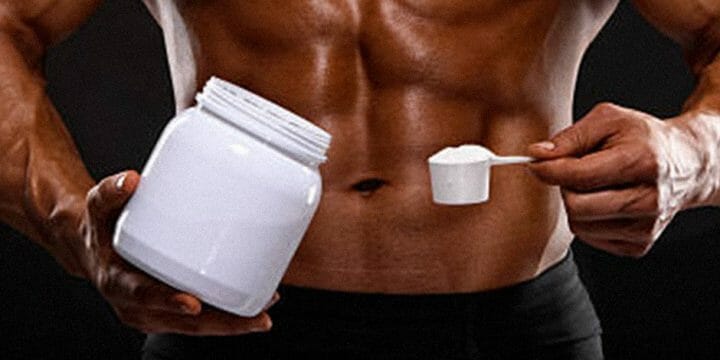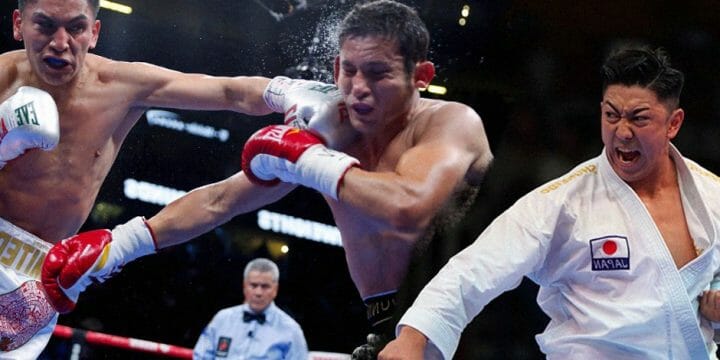Testosterone is a hormone that plays a role in maintaining muscle mass, bone density, and red blood cell levels.
After the age of 30, testosterone production gradually declines. That’s why many gym enthusiasts decide to take steroids to increase their levels. However, there is a major difference between these two terms.
Recently, I’ve teamed up with an endocrinologist to determine the distinction between testosterone and steroids so that there’s no confusion about what your body exactly needs.
Here’s what I’ve found out.
Quick Summary
- Testosterone can be classified as an anabolic steroid, particularly in the androgen class.
- Boosting immunity, energy production, and muscle growth are some of the benefits attributed to anabolic steroids.
- Research by the International Journal of Environmental Research and Public Health shows that increasing testosterone levels through hormone replacement therapy or the use of anabolic steroids is beneficial to bone mass density.
- From what I've seen, the benefits of responsibly managed TRT far outweigh the risks, especially when compared to the dangers of illegal steroid use
Is Testosterone a Steroid?
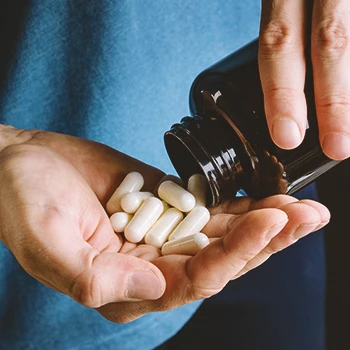
Testosterone is the primary anabolic steroid hormone that belongs to the androgen class.
According to studies published on Science Direct, the body naturally produces steroids for several vital physiological functions, such as the development of muscle tissue [1].
People often confuse testosterone in TRT with illegal anabolic steroids, but they differ significantly.
Anabolic steroids, which are prescription-based, mimic testosterone's effects, enhancing strength and muscle size.
From my experience as a trainer, I advise against using anabolic steroids unless medically necessary due to potentially severe side effects.
What Is a Steroid?

A steroid is a chemical compound with a specific molecular structure. It plays a vital role in many physiological processes, including muscle growth, energy production, and immunity.
Anabolic steroids are taken as medications to treat medical conditions such as asthma, allergies, and chronic hives. However, many gymgoers use illegal steroids to build muscle or improve athletic performance.
Risks of Using Anabolic Steroids
In my experience as a fitness trainer, I've seen the harsh reality of anabolic steroid misuse. Some of the many side effects of anabolic steroid misuse that I've seen include:
- Heart attack
- High blood pressure
- Stroke
- Liver damage
- Renal failure
- Severe psychological issues like depression and roid rage
- Breast tissue shrinking, facial hair, voice deepening, and irregular or absent menstruation in women as shown in studies published on Science Direct [2]
Additionally, the psychological impact of steroid use is profound, with effects ranging from depression to 'roid rage.'
Anabolic steroids affect your health on several levels.
That’s why, as a personal trainer, I never recommend anabolic steroids for aesthetic purposes because the risks associated with using them far outweigh any possible rewards.
What’s the Difference Between Testosterone and Anabolic Steroids?
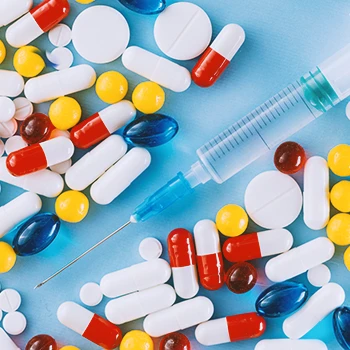
TRT and anabolic steroids both use testosterone. However, TRT involves lower doses for medical purposes. In addition, the process is monitored by a medical expert at all times, as shown by WebMD [3].
As a result, testosterone replacement therapy is legal, safe, and effective.
In contrast, anabolic steroids, often used illegally in high doses, aim to enhance muscle and athletic performance.
TRT is specifically for those who can't produce enough testosterone naturally, while anabolic steroids are typically misused for physical enhancement.
Related Articles:
Testosterone Replacement Therapy (TRT)

If you have low T-levels, your doctor may suggest testosterone (androgen) replacement therapy, typically through injections or gels.
Online clinics offer easy access to TRT, but be aware of potential long-term side effects, as cautioned by health experts.
Benefits of Low Testosterone Therapy
From my personal experience working with clients undergoing low testosterone therapy, the benefits are tangible. They include:
- Boosted energy levels – Testosterone helps increase the number of red blood cells responsible for delivering oxygen to the tissues.
- Improved sex drive – The primary male sex hormone plays a vital role in developing male reproductive tissues, promoting secondary sexual characteristics, and deepening the voice.
- Increased bone density – The causes of low testosterone levels are associated with low bone mineral density (BMD). Research by the International Journal of Environmental Research and Public Health shows that increasing T levels through hormone replacement therapy or the use of anabolic steroids is beneficial to BMD [4].
After beginning testosterone replacement medication, most men experience a reduction in symptoms within four to six weeks, while other effects, such as an increase in muscle mass, may take three to six months, as reported by Havard Medical School [5].
Your doctor might recommend several safe ways to maintain healthy testosterone levels:
- Skin patches
- Gels
- Oral therapy
- Testosterone injections
- Pellets.
Possible Side Effects of Low Testosterone Therapy
I've had clients who experienced side effects from low testosterone therapy.
Here is what some may experience:
- Acne – Testosterone increases sebum production, which may cause an acne outbreak.
- Disordered breathing – Disturbed breathing while sleeping is frequently reported during or after testosterone treatment.
- Breast swelling – Hormonal changes in the body can cause breast tissue to become enlarged.
- Swelling in the ankles – Swelling of the feet, ankles, and legs may emerge because low testosterone treatment causes your body to retain more water (edema).
Learn More: TRT and Acne: Causes and Ultimate Treatments Guide
Do You Need Testosterone Replacement Therapy?

If your total testosterone is under 300 ng/dl or your free testosterone is below 9.0 ng/dl, consider TRT, starting post-assessment.
If you have a history of breast cancer or prostate issues like nodules or carcinoma, TRT may not be suitable. Medical professionals often exercise caution when prescribing TRT to those at high risk of prostate cancer or with an existing low-grade disease.
In my experience as a personal trainer, choosing the right TRT clinic is vital for effective treatment. I recommend exploring the top online TRT clinics for their convenience and quality.
FAQs
Is a Testosterone Booster a Steroid?
No, a testosterone booster is not a steroid. While testosterone boosters are man-made supplements produced to boost your body's production of testosterone, steroids are a synthetic version of testosterone.
What Are Testosterone Steroids Used For?
Testosterone steroids are used for promoting and maintaining male sex characteristics such as muscle growth, facial hair, and deep voice.
Is Testosterone a Steroid or Protein?
Testosterone is a steroid hormone belonging to a class of hormones called androgens, which are responsible for the development of male characteristics.
Will Steroids Work Without Training?
Yes, steroids will work without training, but you won't see the same level of muscle strength as you would if you were training. In order to make the most of your steroid cycle, you need to be putting in some serious effort in the weight room.
References:
- https://www.sciencedirect.com/topics/veterinary-science-and-veterinary-medicine/testosterone
- https://www.sciencedirect.com/topics/medicine-and-dentistry/steroid-abuse
- https://www.webmd.com/men/replacement-therapy
- https://www.ncbi.nlm.nih.gov/pmc/articles/PMC6765788/
- https://www.health.harvard.edu/mens-health/treating-low-testosterone-levels
About The Author
You May Also Like
